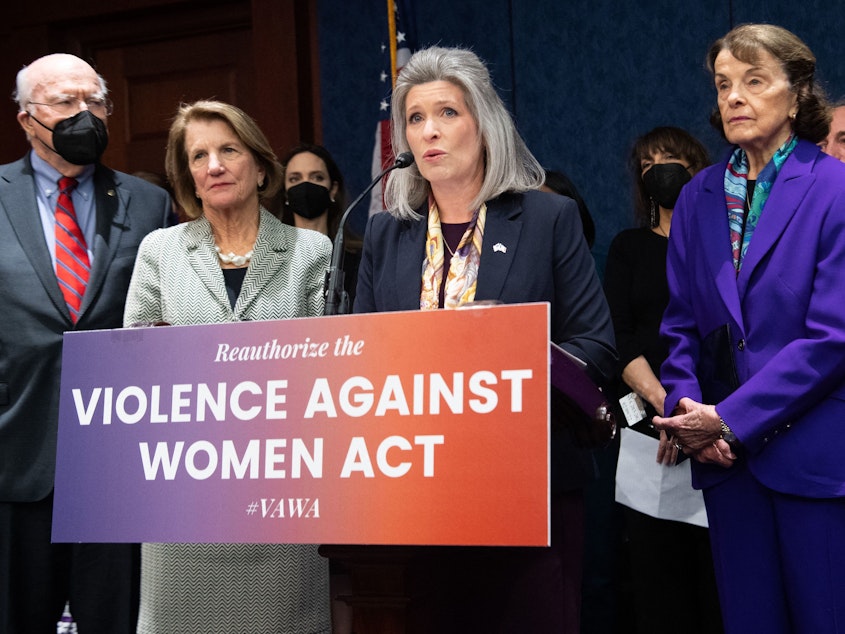Senators announce a deal to reauthorize the Violence Against Women Act

A bipartisan group of senators on Wednesday announced that they had reached an agreement on a reauthorization of the Violence Against Women Act, after months of negotiations in the chamber.
The legislation offers resources for victims of domestic abuse and sexual violence.
Updated February 9, 2022 at 6:33 PM ET
Democrats Dick Durbin and Dianne Feinstein and Republicans Joni Ernst and Lisa Murkowski led the Senate talks.
Durbin, the No. 2 Democrat in the chamber, noted that neither party achieved everything they wanted in the reauthorization, but hailed the compromise as a step toward better addressing the needs of domestic abuse survivors.
Sponsored
"Our bill is a compromise," he said. "It doesn't include everything Sen. Feinstein and I wanted, or everything Sen. Ernst and Murkowski wanted. And there are provisions that all four of us very much wanted to include, such as an end to the loophole that allows abusers who harm dating partners to continue to have access to guns."
The Illinois senator was referencing the so-called "boyfriend loophole," which restricts convicted spousal abusers from accessing firearms, but in some instances does not impose the same restrictions on dating partners who have been charged with abuse.
"But we agreed that we had to introduce a bill that would both deliver the critical assistance survivors across America need, and achieve the necessary bipartisan support to pass the Senate. We are confident the bipartisan agreement we reached will do just that," Durbin said, calling the legislation "a lifesaving law that aims to ensure every survivor can reach a lifeline in a moment of crisis."
The original Violence Against Women Act, signed in 1994 by then-President Bill Clinton, was a landmark moment in the federal government more aggressively penalizing those convicted of domestic abuse as well as to provide legal protections for those who accuse their partners of intimate violence.
President Biden, who as a senator played a leading role in passing the original legislation, said in a statement Wednesday that he was "grateful that this critical bipartisan bill is moving forward, and I look forward to Congress delivering it to my desk without delay."
Sponsored
In a joint press release, the four senators who championed the Senate bill noted that VAWA had been reauthorized under both Democrats and Republicans — in 2000, 2005 and 2013.
The House passed a renewal of the act last year. As NPR's Susan Davis reported then, the law lapsed at the end of 2018 but "had little practical effect because Congress continues to fund related programs despite the lack of authorization."
According to the senators' release, their bill, which would reauthorize VAWA through 2026, includes provisions to strengthen rape prevention and education efforts, provide legal funding and increase support for marginalized communities like LGBTQ survivors and "expand special criminal jurisdiction by tribal courts to cover non-Native perpetrators of sexual assault." [Copyright 2022 NPR]



